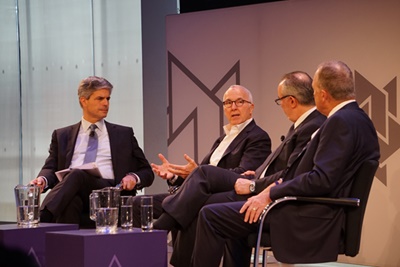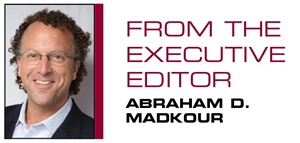NHL Commissioner
Gary Bettman made it very clear: He feels the NHL’s participation in the Olympics is one-sided, taken advantage of and not at all reflective of the league’s value and effort.
This was the main takeaway during my one-on-one interview with him at The Sport Business Summit in New York City late last month. At the session, which is put on by our good friends and partners at Leaders, I attempted to get Bettman to outline a pathway to participate in the 2018 Games next February in South Korea, which I still believe they will. But perhaps sensing the global makeup of the audience, he aggressively criticized the structure. The issues are well-known: A three-week disruption to the NHL’s season, potential injuries, the expense of sending players, the inability to market or use any intellectual property, content or programming around the Games across any of the league’s platforms, and the unfriendly time zones in South Korea and China, the site of the next two Games.
He said the league has been “unable to quantify any benefit” from participating in the past five Games (which frankly surprised me), and said that while Salt Lake City and Vancouver were a success, the other three were largely forgettable. But Bettman was just getting started.
He noted the league sends $3.5 billion “worth of player contracts” to the Games, and said the league approached the International Olympic Committee about becoming a TOP sponsor or “official supplier” of the Games (which drew some laughs) considering the league provides them with content, but the governing body was not interested. But when I suggested that the players, who are the league’s true partners in this effort, really want to participate and shouldn’t that mean something, Bettman acknowledged it did but that was a bridge to be crossed at a future time.
The league is not excited about South Korea, but it has a different mindset about leveraging the massive Chinese marketplace during the 2022 Olympics in Beijing. Bettman was in the country last week to announce a slate of preseason games and other activities. He’s bullish on the growth opportunity there.
Bettman has a few goals with his aggressive rhetoric regarding South Korea: First, he’s looking at building the value of the World Cup of Hockey. To the league, that’s their Olympics — where they own all the intellectual property and operate the event. Two, Bettman’s playing the bad cop and insisting the IOC and IIHF offer him something — anything of value — to change the league’s tune.
Also, he’s definitely representing his bosses’ wishes, as a great majority of owners don’t want to go to Pyeongchang. Influential voice Jeremy Jacobs has said he’s not interested; Minnesota Wild owner Craig Leipold flatly told me in January he didn’t want players to go; and Ottawa Senators owner Eugene Melnyk was perhaps most blunt when he told Elliotte Friedman in Canada that he was opposed to sending his best player, Erik Karlsson, to play for Team Sweden and likely beating Melnyk’s home country as well.
“So I’m going to give Sweden my best player at the risk of him being injured,” he said. “Beating our Canadian team. That doesn’t make sense.”
The NHL’s decision will have far implications; Every national federation wants the league to go so they don’t have to start searching for national players to fill rosters. The NHL players want to go, and some insist they will play no matter what. This comes while the league’s current CBA has opt-outs in 2019, and that could play a role here.
Bettman’s remarks created significant buzz at the summit. Some backed his position and rolled their eyes at the outdated lack of flexibility of the IOC, while others stressed the importance of the Olympic movement and suggested the NHL, already having participated in five previous Games, knew the rules and should be the morally bigger party in the dispute and participate.
The puck sits on the IOC/IIHF side of the ice: Will they give up something of true value to guarantee participation of one of the most popular Olympic sports? Bettman has little to lose here and no risk in overplaying his hand.
In the end, I believe the league gets enough and will play — whether related to a CBA extension, or IP/content rights, or considerations from rights holder NBC or the IOC. Saying no to the Games would needlessly risk the productive peace with the players association as well as the chance to participate in the promising China Games in 2022, where the league sees great potential.
 |
Frank McCourt discussed family dynamics in ownership on a panel at The Sport Business Summit in New York.
Photo by: GETTY IMAGES |
THE LESSONS OF MCCOURT: Former Los Angeles Dodgers owner
Frank McCourt made a rare public appearance, speaking about team ownership at Leaders, as he is now majority owner of Olympique de Marseille, which is part of Ligue 1. I found him to be one of the most compelling speakers of the two days. To a question posed by moderator
Joe Leccese of Proskauer, he told the audience about one of the lessons learned during his embattled ownership of the Dodgers, which he sold in 2012 after going through a very public divorce with his wife and team partner,
Jamie. I found his comments very insightful about setting up the right structure in family ownership.
“If I learned nothing else in my time with the Dodgers is that family ownership is fantastic in sports,” he said. “You want families to own teams, if you can.” He noted that corporate ownership of teams, “we would probably agree, doesn’t have the same fire in the belly regarding [ownership].”
But there are clearly the right ways to structure a family’s oversight of a sports team. “You don’t necessarily want to have family in management, because then other situations can complicate [it], you know, if you have a personal issue. In my case, it was a divorce. What it does is it complicates the management of the team and so on and so forth. That is, to me, a cardinal rule, now. And then two, the alignment with ownership, with your CEO, with your general manager, or what they call in Europe, sporting directors, you need everybody on the same page.
“That was a challenge in L.A. as a first-time owner. It took me some time to figure that out. In Marseille, I came with knowledge of what I had to do.”
FROM THE NOTEBOOK: Bettman noted the league is looking at the idea of hosting an esports hockey league competition, similar to what the NBA is doing with its partner, Take Two Interactive. “I could envision a leaguewide competition where each club runs a competition to see who will be represented in the equivalent of our championship, but for our esport game,” he said. Bettman said that the league is in discussions with its video partner, EA Sports, about such a concept. … Phoenix Coyotes owner Andrew Barroway has had his share of challenges in the market since buying majority control of the team two years ago. He noted the difficulty in trying to build a fan base in the transient Phoenix market. “As an owner, that’s one of my biggest frustrations,” he said. “It’s a transient market, and I’m certainly OK with the older fans wearing the opposing [team] jerseys, but when they have their kids wearing the opposing jerseys, that’s tough. That’s a tough riddle and I haven’t solved it.” Asked how he could change that, Barroway paused before fellow panelist McCourt chimed in,“The Stanley Cup would be the best way.” Barroway laughed and said, “Yes, you’re right!” .... Many owners (and team executives) look dismissively at league oversight and action, but it sounds like Barroway’s changed his tune on the role of a league office. He is a better owner, he said, because of his willingness to learn and listen from the league office, which wasn’t always the case. “I had an independent streak that was thankfully beat out of me,” he said, smiling. “You have to rely on league leadership and embrace the structure. It can be very, very helpful.”
Abraham D. Madkour can be reached at amadkour@sportsbusinessjournal.com





